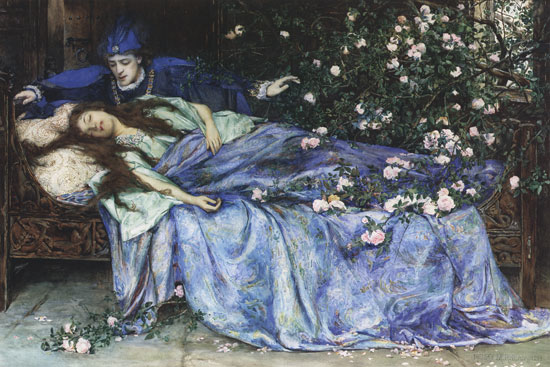
Plum in the center of the room, the prince can see the body of the girl, who is sleeping on a litter of oak branches and wrapped round in flowers of every color. He quickly dismounts and kneels by her side. He takes her hand. It is cold. And her white face, too, like a dead girl’s. Not to mention her thin, purple lips. Conscious of his role in the story, the prince kisses her lovingly. He knows this is the kiss that must bring her back to life, the kiss the princess has been waiting for forever, since the witch’s curse put her to sleep. The prince leans his head backwards so he can gaze at her when she lifts her eyelids and opens those large, almond eyes.
But the girl is still asleep. Perhaps, thinks the prince, he kissed her too lightly. He stoops down again and kisses her a second time, this time a touch more vigorously. However, the princess doesn’t wake up. The prince persists. He squeezes the girl’s cheeks with his index fingers and his thumbs so her mouth opens slightly, to make the kiss more intense. Then he puts his tongue inside, curls it around hers, takes it out, nibbles her upper lip, and immediately afterwards her lower lip. He kisses her ardently, as he has rarely kissed anyone before. These kisses arouse the prince. He feels something swelling in his crotch that soon hurts because of the tight tutu he is wearing. But then he restrains himself because he reckons that, when the girl wakes up, he will be able to unleash the passion that is coursing through him. He is certain that the girl will wake up feeling equally passionate.
Nonetheless, however much he kisses her, the princess doesn’t wake up. The prince stops for a moment, caresses her cheeks, and immediately starts to kiss her again: he kisses her repeatedly, ever more energetically. What kind of prince in blue is he, if his kisses aren’t able to wake up the sleeping maiden? Princes in blue always boast about waking up princesses with a single but irresistible kiss. He feels useless, and is thankful that at least no one else is in the room watching him.
Maybe his kisses don’t wake her, but this should do the trick. Just in case the nipple licking has made no impact, he brings his lips back to hers and kisses her ardently.
Things should be going differently. He should kiss her and she should wake up. He has been at it for a quarter of an hour and both their lips have swollen because the kisses were so passionate. He now unbuttons the girl’s blouse and gazes at her breasts: round, pert, and perfect. He looks in awe at her nipples that are large and pinky brown. When he inspects them closely, they suggest the porous quality of a lunar landscape. He wets them with his tongue, clamps them between his lips and sucks hard: first one and then the other. Maybe his kisses don’t wake her, but this should do the trick. Just in case the nipple licking has made no impact, he brings his lips back to hers and kisses her ardently. He puts his hand under her skirt, strokes her thighs, and reaches the vertex they form with the pubis. Finally he lifts her skirt completely up and gazes at her legs that are pale, tensed, soft, and simply splendid. He gradually lifts her body with one hand and takes her panties off with the other. He kneels down in front of her, separates her legs and the lips he finds there. He brings his mouth down on her, licks her, flickers his tongue in there, runs it along each fold in the most intimate kiss—he believes, in his innocence—that a prince has ever given a princess. This is the definitive kiss, he thinks, the kiss that awakens sleeping princesses. He lingers there awhile, and the more he lingers, the more he is aroused, until, unable to contain himself any longer and ruminating that perhaps the business of the kiss is only a metaphor for a more radical form of contact, he pulls down his tutu and inserts himself between the girl’s legs. He moves in and out, first slowly and then ever more forcefully, until each thrust shakes her whole body. But even so she doesn’t wake up. Disappointed, the prince stops, withdraws, and rests his head on the girl’s bosom. He is tired and makes a space on the litter next to her, and he gazes at her. She is so beautiful that he soon feels passion returning, overwhelming him again. The girl still doesn’t wake up. He spends the whole night in this state, and returns to the breech ever more convinced that sooner or later she will wake up, but he is the one who falls asleep at the break of dawn, exhausted, embracing her body. A few minutes later the girl stirs, looks at him for a second—he is so handsome—shakes his arm off, and gets up, feeling out of sorts. What is this sleep she is awaking from? How long ago did she close her eyes? She struggles to remember anything, and gradually walks off. The prince is sleeping deeply, unaware that nobody will ever come to wake him up.
